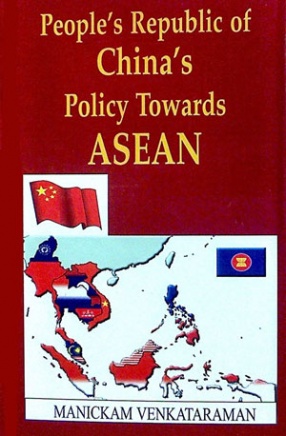People's Republic of China's Policy Towards ASEAN, 1967-1990
This book analyzes People’s Republic of China’s (PRC) policy towards ASEAN during 1967-1990. In a span of less than three decades, PRC’s policy had undergone sweeping changes from one of hostility in August 1967 when ASEAN as an organization was formed to one of cordiality by October 1990 when PRC established diplomatic relations with all member states of ASEAN. This study therefore reveals the inter-connecting issues by posing some basic questions: What criteria does a country adopt while framing its policies towards other countries? Is it guided primarily by its national interests or does its policies gets superimposed by other countries? Do its policies evolve out of colonial subjugation or does it depend on external factors? To what extent is ideology an important factor in foreign policy?
This book answers these in the light of the emergence of PRC as a united country under the leadership of the Communist Party of China (CCP). Its interaction, hence, with the non-communist grouping of ASEAN becomes all the more important in the light of the above posers. The study elaborates and interprets the changes in Sino-ASEAN equations, the motivations of ruling elites and the consequences that followed as a result of changes in international relations by enquiring into the extent to which ideology played a role in the policies and mutual perceptions of China and ASEAN; the changes in international situation -- quadrilateral relations among USA, Soviet Union, China and Vietnam--affect relations between PRC and ASEAN and the compulsions of the ruling elites of ASEAN to sink their varying perceptions of China and adopt a common policy towards that country. These issues are probed in a chronological perspective blending both Southeast Asian Studies and Chinese Studies, areas which are unfortunately neglected in Indian Universities. In fact, this is the first such study undertaken in India on the subject.
This book concludes that during the period under study, People’s Republic of China's Relations with Southeast Asia, especially member states of ASEAN, were profoundly influenced by its attitude towards united states and soviet union and the equations that the Southeast Asian countries had with USA and USSR. Its policies were also shaped by the tumultuous domestic developments, especially the cultural revolution and, in all latter phase, by the economic modernization programmes and the necessity to channel the capital and technical expertise of the Chinese minorities in Southeast Asian countries. On the part of ASEAN it gradually emerged as a well-knit cohesive group and displayed remarkable adroitness in dealing with external powers, especially PRC including displaying a remarkable resilience in containing the communist threat relegating it as a memory of the past and thereby facilitating the establishment of full diplomatic relations with PRC.
Get it now and save 10%
BECOME A MEMBER







Bibliographic information
Tags